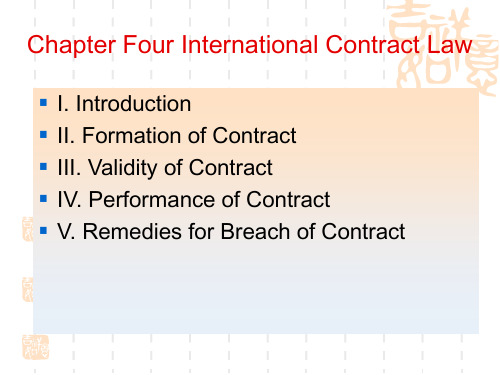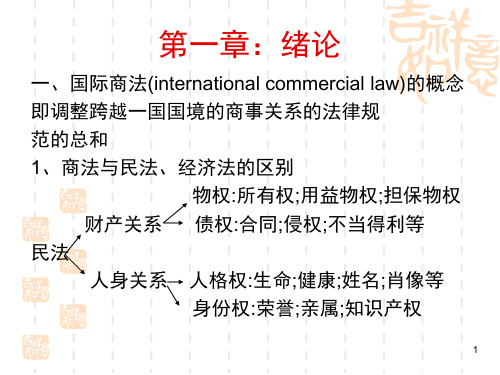国际商法课件 English .ppt
合集下载
国际商法 第二版 英文版 姜作利 课件

III Sources of international business law
C International model law
Definition: rules and norms worked out and passed by some international organizations for the free choice by nations. Examples: 1. Model Law on International Commercial Arbitration by the United Nations Commission on International Trade Law (联合国国际贸易法委员会国际商事仲裁示 范法 UNCITRAL Model Law) 2. Principles of International Commercial Contract by the International Institute for the Unification of Private Law (国际统一私法协会国际商事合同通则, UNIDROIT PICC )
VI International Organizations
• A. Organization Affiliated with UN
• 4. ― World Bank‖ (two institutions) 世界银行 • The International Bank for Reconstruction and Development 国际复兴开发银行(世界银行) • (loans at market terms, not high-risk loans) • International Development Association 国际发展协会 • (loans to poor countries with average per capital GNP less than $ 410 on more favorable terms, but only to government) • International Finance Corporation 国际金融公司 • ( loans to private enterprises in developing countries)
国际商法的电子教案PPT课件

.
1
经济法:国家在调整干预经济活动时的法律规范。如 反垄断法、反不正当竞争法、税法、预算法、审 计法、环境资源保护法、消费者利益保护法、交 通运输法等。
经济法产生和发展的过程是法律从个人权利本位到 社会权利本位的过程。
2、国际商法与国际法、国际私法、国际经济法的 区别
国际私法:“结婚的适用婚姻缔结地法”、“合同 的适用与合同有最密切关系的国家的法律”、 “继承的适用被继承人死亡地法,不动产的使用 不动产地法”、“侵权的适用侵权地法”
第一章:绪论
一、国际商法(international commercial law)的概念 即调整跨越一国国境的商事关系的法律规 范的总和 1、商法与民法、经济法的区别
物权:所有权;用益物权;担保物权 财产关系 债权:合同;侵权;不当得利等 民法 人身关系 人格权:生命;健康;姓名;肖像等
身份权:荣誉;亲属;知识产权
.
9
第二章 商事组织法
第一节 商事组织的法律形式
俄罗斯14岁(2002年前为16岁); 菲律宾男16岁,女14岁; 韩国法定结婚年龄:男18岁、女16岁以上。未满20岁者,要申请结 婚时必须有父母的同意。女子在婚姻六个月内不能申请再婚,但有医 生的妊娠诊断证明可作例外处理。 巴西16岁; 澳大利亚男21岁,女18岁; 英国16岁; 德国18岁; 法国男 18岁,女15岁; 希腊男14岁,女12岁; 美国统一结婚法规是18岁,但美国各洲不一,部分州规定男21岁,部 分州规定,如双方未满成年人年龄,须经父母同意方可结婚,有的州 规定男子不满18岁、女子不满16岁者,即使父母同意也不能结婚。 爱达荷、密西西比、新泽西和华盛顿等州则允许年满14岁的男孩、 年满12岁的女孩结婚。 二、最高结婚年龄除沙俄民法规定年满80岁以上不得结婚外,古今中 外未发现其他规定最高结婚年龄的国家或地区。
国际商法 全套课件(英文)607页PPT

• 4. The Development and Tendency of Modern International Business Law
• On the one hand, after the Second World War the rapid development of the world economy made the contact of each country more frequently. This made it necessary that a set of uniform international law regulating the relationship of international economy and trade should be made.
international commercial law, refers to the body of legal rules and norms that regulates international trade and international business organizations. • 2. The meaning of “International” • A commercial transaction is international if: • (1) the parties have their places of business in different States or Countries;
• 9.rule of law: 法治。
• 10. legal doctrines: 法律理论。
• 11.legal validity: 法律效力。
I. Definition of International Business Law
• On the one hand, after the Second World War the rapid development of the world economy made the contact of each country more frequently. This made it necessary that a set of uniform international law regulating the relationship of international economy and trade should be made.
international commercial law, refers to the body of legal rules and norms that regulates international trade and international business organizations. • 2. The meaning of “International” • A commercial transaction is international if: • (1) the parties have their places of business in different States or Countries;
• 9.rule of law: 法治。
• 10. legal doctrines: 法律理论。
• 11.legal validity: 法律效力。
I. Definition of International Business Law
国际商法 第二版 英文版 姜作利 课件

Documentary Credits (UCP600 跟单信用证统一惯例)
2020/3/8
III Sources of international business law
D International trade customs and usages
• Influence: not law, but plays an important role. • 1. as binding rules by agreed upon by the parties to the
2020/3/8
III Sources of international business law
A National law
The most important source. Take China as an example: The Contract Law Trademark Law Chinese-Foreign joint Venture (Cooperative) Law, The Civil Procedure Law Arbitration Law
Examples: 1. Model Law on International Commercial Arbitration by
the United Nations Commission on International Trade Law (联合国国际贸易法委员会国际商事仲裁示范法 UNCITRAL Model Law) 2. Principles of International Commercial Contract by the International Institute for the Unification of Private Law (国际统一私法协会国际商事合同通则, UNIDROIT PICC )
2020/3/8
III Sources of international business law
D International trade customs and usages
• Influence: not law, but plays an important role. • 1. as binding rules by agreed upon by the parties to the
2020/3/8
III Sources of international business law
A National law
The most important source. Take China as an example: The Contract Law Trademark Law Chinese-Foreign joint Venture (Cooperative) Law, The Civil Procedure Law Arbitration Law
Examples: 1. Model Law on International Commercial Arbitration by
the United Nations Commission on International Trade Law (联合国国际贸易法委员会国际商事仲裁示范法 UNCITRAL Model Law) 2. Principles of International Commercial Contract by the International Institute for the Unification of Private Law (国际统一私法协会国际商事合同通则, UNIDROIT PICC )
《国际商法英文版》课件

History and Development
02
The main content of international commercial law
Business Association Law: This law regulates the establishment, operation, and termination of business organizations It defines the rights and observations of shareholders, directors, and managers
Trade Barriers
01
International business law helps to remove trade barriers, such as tarifs and non tariff measures, facilitating free trade among nations
Conflict of Laws
Addressing legal conflicts that may arise between different countries' laws in multilateral operations, promoting a clear framework for disk resolution
PPT courseware for the English version of Internat
Overview of International Commercial LawThe main content of international commercial lawApplication of International Commercial LawThe Future Development of International Commercial Law
国际商法课程ppt课件

◆ 调整国际票据关系的国际条约: 1930年、1931年《日内瓦公约》
资 金 是 运 动 的价值 ,资金 的价值 是随时 间变化 而变化 的,是 时间的 函数, 随时间 的推移 而增值 ,其增 值的这 部分资 金就是 原有资 金的时 间价值
1.国 际 条 约
◆ 关于知识产权的国际条约: 1883年《巴黎公约》 1891年《马德里协定》
(三)普通法系(Common Law System ) 也称作英美法系、判例法系
起源:中世纪英国的习惯法 2. 代表国家:英国、美国(P6) 3. 渊源:判例——先例约束力原则 4. 特点:英国——普通法和衡平法
美国——此外,联邦法和州法
•ቤተ መጻሕፍቲ ባይዱ
资 金 是 运 动 的价值 ,资金 的价值 是随时 间变化 而变化 的,是 时间的 函数, 随时间 的推移 而增值 ,其增 值的这 部分资 金就是 原有资 金的时 间价值
案例
中国贪官为何总逃往加拿大 新入伙人对入伙之前的债务是否负责?
中国:连带责任;英国:不负责任 中国外贸代理制、货代、船代 FOB CFR CIF
要约(发盘) 承诺(接受)
资 金 是 运 动 的价值 ,资金 的价值 是随时 间变化 而变化 的,是 时间的 函数, 随时间 的推移 而增值 ,其增 值的这 部分资 金就是 原有资 金的时 间价值
1.国 际 条 约
各国缔结的有关国际商业和贸易的国际条约或公约。 重要渊源
资 金 是 运 动 的价值 ,资金 的价值 是随时 间变化 而变化 的,是 时间的 函数, 随时间 的推移 而增值 ,其增 值的这 部分资 金就是 原有资 金的时 间价值
1.国 际 条 约
有关国际商法的国际公约: ◆ 调整国际货物买卖关系的条约: 1974年《国际货物买卖时效期限条约》 1980年《联合国国际货物销售合同公约》
资 金 是 运 动 的价值 ,资金 的价值 是随时 间变化 而变化 的,是 时间的 函数, 随时间 的推移 而增值 ,其增 值的这 部分资 金就是 原有资 金的时 间价值
1.国 际 条 约
◆ 关于知识产权的国际条约: 1883年《巴黎公约》 1891年《马德里协定》
(三)普通法系(Common Law System ) 也称作英美法系、判例法系
起源:中世纪英国的习惯法 2. 代表国家:英国、美国(P6) 3. 渊源:判例——先例约束力原则 4. 特点:英国——普通法和衡平法
美国——此外,联邦法和州法
•ቤተ መጻሕፍቲ ባይዱ
资 金 是 运 动 的价值 ,资金 的价值 是随时 间变化 而变化 的,是 时间的 函数, 随时间 的推移 而增值 ,其增 值的这 部分资 金就是 原有资 金的时 间价值
案例
中国贪官为何总逃往加拿大 新入伙人对入伙之前的债务是否负责?
中国:连带责任;英国:不负责任 中国外贸代理制、货代、船代 FOB CFR CIF
要约(发盘) 承诺(接受)
资 金 是 运 动 的价值 ,资金 的价值 是随时 间变化 而变化 的,是 时间的 函数, 随时间 的推移 而增值 ,其增 值的这 部分资 金就是 原有资 金的时 间价值
1.国 际 条 约
各国缔结的有关国际商业和贸易的国际条约或公约。 重要渊源
资 金 是 运 动 的价值 ,资金 的价值 是随时 间变化 而变化 的,是 时间的 函数, 随时间 的推移 而增值 ,其增 值的这 部分资 金就是 原有资 金的时 间价值
1.国 际 条 约
有关国际商法的国际公约: ◆ 调整国际货物买卖关系的条约: 1974年《国际货物买卖时效期限条约》 1980年《联合国国际货物销售合同公约》
第1章 国际商法概述 《国际商法》PPT课件

在现代大陆法系国家的商法中, 最具有代表性、影响力最大的是 法国和德国的商事法。1807年的 《法国商法典》和1900年的《德 国商法典》曾是许多大陆法系国 家仿效的对象,大陆法系亦是以 此为基础建立起来的。
• (1)法国商事法。 • (2)德国商事法。
1.3 西方两大商法体系
1.3.3 英美法系中的商法体系
英美法系国家以英国和美国为代表,尽管两国在法律渊源等方面有许多近似之处,但在自身
的发展过程中也形成了各自独特的体系,商法体系也不例外。
1)英国商事法 英国是传统的判例法国家,没有像大陆法那种形式意义上的商法,但在英国存在实质上的商法。可以毫不夸张 地说,大陆法系现代商法中的各项基本制度在英国法中均有类同的法律概括,这不仅表现在有关公司法、票据 法、保险法、破产法等特别法中,而且表现在对商人资格、商业组织、商事合伙、商事代理等一系列的基本规 定和定义概括中。 英国的商人法像大陆法系一样,也起源于中世纪的商人习惯法。
1.2.1 国际条约
国际条约或公约是国际商法的最 主要渊源,是国际法主体之间以 国际法为准则,为确立其相互权 利、义务而缔结的书面协议。
1.2.3 国内商事法
国际商法的主体主要是各国的自然人和法 人,国家只有在特殊情况下才会成为国际 商法的主体,这个特点决定了各国的国内 商事法也是国际商事行为的法律依据。
1.3 西方两大商法体系
1.3.2 大陆法系中的商法体系
1)民商合一与民商分立
2)各国的商事法
在对待商法的态度上,大陆法系 国家有两种做法:有些大陆法系 国家把民法和商法分别编成独立 的法典,即民法典和商法典。
• (1)民商合一。 • (2)民商分立。 • (3)民法与商法的适用原则。 • (4)我国民法与商法的关系。
《国际商法》PPT课件

.
15
思考与练习
一、名词解释 国际商法
事惯例
国际商事条约
国际商
二、简答题 (1)国际商法的渊源有哪些? (2)大陆法系与英美法系有哪些区别?
.
16
第二章 国际商事组织法
学习目标:
▲素质目标:对各种商事组织的设立及其管理具有一 定的实际操作能力。
▲能力目标:具有依法设立各种商事组织的能力;依 法管理合伙企业和公司的相关能力。
• 主要有两种具体表现形式,一种是实体法规 则的国际条约,这些公约能够有效消除各缔 约国在这些领域的法律冲突。另一种是冲突 法规则的国际公约,这些公约可以使各缔约 国在这些领域内的法律冲突规则得到统一, 为国际商事案例确定准据法。
.
6
相关链接:
• 实体法是指在国际条约和协定中直接规定 当事人的权利和义务关系,不需要借助其 他法律规定来确定当事人的权利和义务关 系。
▲知识目标:熟悉各种商事组织形式的概念及其特征。 了解各种商事组织投资者的权利和义务。 了解合伙企业的分类及相互间的区别。 掌握公司设立的相关规定和公司治理结构及其权利 和义务。
重点难点:
1、各种商事组织形式的概念及其特征。 2、各种商事组织投资者的权利和义务。 3、合伙企业的分类及相互间的区别。 4、公司设立的规定。
• 国际商会(the International Chamber of Commerce,ICC):《国际贸易术语解释通则》 《跟单信用证统一惯例》《华沙-牛津规则》《美 国对外贸易定义修正本》
.
8
• 3、各国国内法
尽管已有大量的国际商事公约或惯例,但由于传统 习惯与自身利益所在,各国仍在很多的商事领域中保 留独占的立法权。
民商合一:指民事和商事统一立法,将商事方面的内 容编入民法典中,或以单行法规的形式出现。(中国、 瑞士、荷兰、泰国、意大利、土耳其、东欧一些国家)
国际商法课件( English )

Key Terms
Sole proprietorship: 个人独资企业 Partnership: 合伙企业 Limited partnership: 有限合伙 Limited liability partnership: 有限责任合伙 Incorporated company: 股份有限公司 No-liability company: 无限责任公司 Joint venture: 合资企业 Legal Person: 法人
(3) Professional Restrictions (4) Partner by Estoppel Two persons may not be partners, yet in the eyes of a third person they may appear to be partners. If the third person deals with one of the apparent partners, he may be harmed and seek to recover damages from both of the apparent partners.
Байду номын сангаас
I. Introduction
Business organization, also called business enterprise, refers to the economic organization that pursues management activities with its own name with certain scale. There are two kinds of meaning with international business organization: one is the organization pursuing international business activities; and the other is forms of international business organizations.
国际商法课件(_English_)_4

Requirements of an Offer ① Contractual intention. It is an invitation to treat, which is used to invite others to make offer and lack of the intention to create a binding obligation. Generally, display of goods for sale, an advertisement in a newspaper, posted quotation(寄送的报价单), price list, catalogue(商品目录), auction sales(拍 卖公告) and tenders(招标公告) are all an invitation to treat. ② Definiteness. ③ Communication of offer to of Offer: 要约 Offeror: 要约人 Offeree: 受要约人,承诺人 Acceptance: 接受,承诺 Counteroffer: 反要约 Invitation to treat/Invitation offer: 要约邀请 Withdrawal of offer: 要约的撤回 Revocation of offer: 要约的撤销
③ An acceptance must be made within the period of validity. ④ An acceptance should match the terms of the offer exactly and unequivocally. ⑤ Mostly, silence and inactivity cannot be construed/explained as acceptance.
国际商法课件第五章公司法(英文)

2. The rights of shareholders
2.2 right to information and inspection Right to information :The shareholder has the right to keep himself informed about the financial and operational conditions of the corporations. Right to inspection: The shareholder has a right to inspect corporate records and documents such as shareholder lists, minutes of meetings, financial statements, and even contracts. The inspection must occur at proper times and in the proper places and, most important, must be for proper purposes.
Case Tatko owns about 2% of the shares of Tatko Brothers Slate co. Pursuant to the shareholders’ agreement, if Tatko wishes to sell his shares he is obligated to offer them first to Tatko Brothers co. at “book value”(账面值). The book value is to be determined by resort to the annual balance sheet prepared by the corporation. When Tatko informed the corporation of his interest in selling his shares, he was furnished with the corporation’s latest financial report, which contained a balance sheet listing assets, liabilities and portions of the minutes from a 1973 shareholders’ mபைடு நூலகம்eting. The accountants warned that they had neither audited nor reviewed the financial statements and expressed no opinion on them. The corporation indicated to buy the shares for $ 35,789 and to provide additional records to petitioner, but
国际商法英文版 ppt课件

Case Study:
1. Commission of the European Communities v. Federal Republic of Germany 欧共体委员会诉联邦德国案
2. China’s refusal to accept the doctrine of restrictive sovereign immunity 中国拒绝接受国家主权有限豁免原则案
© 2009 Pearson Education Inc. publishing as Prentice Hall PP1T-课2 件
International Law
Historically, dealt with the rules and norms regulating the relationships between states (countries)
International Business Law Textbook
Ray August, Don Mayer, Michael Bixby. “International Business Law
——Text, Cases and Readings” 6th Edition Pearson
© 2009 Pearson Education Inc publishing as Prentice Hall PPT课件
7. L’Oreal v. eBay 欧莱雅诉eBay案 8. The Natural Gas Case天然气案 9. Great China Metal Industries Co. Ltd. V.
Malaysian International Shipping Corp. 中国金 属工业有限公司诉马来西亚国际航运公司案
国际商法的电子教案PPT课件

(4)分店店长周某的行为违反了法律规定。根据《个人独 资企业法》的规定,投资人委托或者聘用的管理个人独资 企业事务的人员未经投资人同意,不得同本企业订立合同 或者进行交易。因此,周某与个人独资企业订立买卖图书 的合同是不符合规定的。
13
▪ 下列关于个人独资企业的表述中,正确的 是( )。
▪ A、个人独资企业不是独立的民事主体 ,也不能独立承担民事责任
3
二、国际商法的产生和发展 1、古代:以古罗马法(市民法、万民法、自然
法)为代表 2、中世纪:停滞、萎缩 3、近代:国内化趋势加强 4、现代:发展迅速 普通法与衡平法(equity)的区别(衡平法现已不
存在) (1)诉讼程序不同:是否有陪审团(jury)不同 (2)法院的组织系统不同 (3)法律术语不同 (4)救济方法不同:普通法只有金钱赔偿、返
16
2,合伙的成立 一般要求要申请登记领取营业执照,但人数
有一定限制,如美国要求不得超过50人 3,合伙的内部关系 合伙人之间的权利义务关系参见教材50页到
51页 4,合伙的外部关系 无限连带责任;适用互相代理原则;内部对
某个合伙人权力的限制不得对抗善意第3人
17
▪ 甲、乙、丙三人协商达成一书面合伙协议,约定各自出资1 万元,成立一家小百货商店,并按出资比例平均分配盈余,分 担亏损。该商店起字号为“兴旺商店”,1996年1月经核准注 册,取得营业执照。到1996年6月为止,因经营管理不善,该 商店负债累累,欠百货批发公司4万元钱未偿还。此时,甲 便提出退伙,乙、丙二人不同意,甲便提走其出资1万元,径 行退出。兴旺商店由乙、丙二人继续经营。8月,兴旺商店 欲购进一批新式洗涤用品,但货款不足,乙、丙便向丁提出 借款2万元,丁同意借款,但提出一条件,即若这批洗涤用品 赚钱后,乙丙二人除还本付息外,还须将所得利润分与其一 份,若不赚钱,乙、丙二人须届时还本付息。洗涤用品进货 后,因质量低劣、销路不畅,造成亏损5000元。1997年1月, 百货批发公司困向兴旺商店索债不成,便诉至法院;同时,丁 也因乙、丙二人不能还本付息而向法院起诉,法院合并审 理。
13
▪ 下列关于个人独资企业的表述中,正确的 是( )。
▪ A、个人独资企业不是独立的民事主体 ,也不能独立承担民事责任
3
二、国际商法的产生和发展 1、古代:以古罗马法(市民法、万民法、自然
法)为代表 2、中世纪:停滞、萎缩 3、近代:国内化趋势加强 4、现代:发展迅速 普通法与衡平法(equity)的区别(衡平法现已不
存在) (1)诉讼程序不同:是否有陪审团(jury)不同 (2)法院的组织系统不同 (3)法律术语不同 (4)救济方法不同:普通法只有金钱赔偿、返
16
2,合伙的成立 一般要求要申请登记领取营业执照,但人数
有一定限制,如美国要求不得超过50人 3,合伙的内部关系 合伙人之间的权利义务关系参见教材50页到
51页 4,合伙的外部关系 无限连带责任;适用互相代理原则;内部对
某个合伙人权力的限制不得对抗善意第3人
17
▪ 甲、乙、丙三人协商达成一书面合伙协议,约定各自出资1 万元,成立一家小百货商店,并按出资比例平均分配盈余,分 担亏损。该商店起字号为“兴旺商店”,1996年1月经核准注 册,取得营业执照。到1996年6月为止,因经营管理不善,该 商店负债累累,欠百货批发公司4万元钱未偿还。此时,甲 便提出退伙,乙、丙二人不同意,甲便提走其出资1万元,径 行退出。兴旺商店由乙、丙二人继续经营。8月,兴旺商店 欲购进一批新式洗涤用品,但货款不足,乙、丙便向丁提出 借款2万元,丁同意借款,但提出一条件,即若这批洗涤用品 赚钱后,乙丙二人除还本付息外,还须将所得利润分与其一 份,若不赚钱,乙、丙二人须届时还本付息。洗涤用品进货 后,因质量低劣、销路不畅,造成亏损5000元。1997年1月, 百货批发公司困向兴旺商店索债不成,便诉至法院;同时,丁 也因乙、丙二人不能还本付息而向法院起诉,法院合并审 理。
国际商法概述PPT课件

公法以权力为轴心,严守“权力法定”的定律;私法则以 权利为核心,适用“权利推定”的逻辑。
公法奉行“国家或政府干预”的理念,私法遵循“意思自 治”、“私法自治”的原则。
公法以政治国家为作用空间,私法以市民社会为功能范域。
.
22
商法的基本原则principal
1.维护市场正常运行原则 2.提高商事交易效益原则 3.保障商事交易安全原则
.
11
商法与经济法economic law的共性
都是规范经济活动的法律 经济法是公法,商法也带有某些 公法性质
.
12
商法和经济法的不同点
(1)所追求的利益不同
商法——着眼于商事主体的权益,侧重保护商事主体个体
经济法——着眼于整个国民经济生活的全局,侧重维护社会 整体利益
(2)调整范围不同
商法———调整商事主体间特有的经济关系
.
7
分类
从表现形式划分: 形式意义的商 法、实质意义的商法
从商法包括的内容划分: 广义商 法,狭义商法
从民法与商法关系划分: 民商合 一,民商分立
依立法基础划分: 商人商法,商行 为商法,折中商法,习惯商法
.
8
三、商法与其他法律的关系
商法与民法 商法与经济法 商法与行政法的关系 商法与劳动法的关系 商法与刑法 商法与国际法
.
2
第一章 国际商法概论
商法概述 国际商法概论 商事法律关系 两大法系
.
3
第一节 商法概述
商的概念 commercial
一般常识的商 经济学角度的商 商法的商(第一种商、第二种商、
第三种商、第四种商 ) 市场经济和商法
.
4
一、商法的商
第一种商:直接沟通商品生产者和消费者 第二种商:货运、仓储保管、居间、行纪、 代理 第三种商:银行、信托、加工承揽、制造、 出版印刷 第四种商:旅馆、饮食、广告、保险.18商法调整对象和范围调整对象
公法奉行“国家或政府干预”的理念,私法遵循“意思自 治”、“私法自治”的原则。
公法以政治国家为作用空间,私法以市民社会为功能范域。
.
22
商法的基本原则principal
1.维护市场正常运行原则 2.提高商事交易效益原则 3.保障商事交易安全原则
.
11
商法与经济法economic law的共性
都是规范经济活动的法律 经济法是公法,商法也带有某些 公法性质
.
12
商法和经济法的不同点
(1)所追求的利益不同
商法——着眼于商事主体的权益,侧重保护商事主体个体
经济法——着眼于整个国民经济生活的全局,侧重维护社会 整体利益
(2)调整范围不同
商法———调整商事主体间特有的经济关系
.
7
分类
从表现形式划分: 形式意义的商 法、实质意义的商法
从商法包括的内容划分: 广义商 法,狭义商法
从民法与商法关系划分: 民商合 一,民商分立
依立法基础划分: 商人商法,商行 为商法,折中商法,习惯商法
.
8
三、商法与其他法律的关系
商法与民法 商法与经济法 商法与行政法的关系 商法与劳动法的关系 商法与刑法 商法与国际法
.
2
第一章 国际商法概论
商法概述 国际商法概论 商事法律关系 两大法系
.
3
第一节 商法概述
商的概念 commercial
一般常识的商 经济学角度的商 商法的商(第一种商、第二种商、
第三种商、第四种商 ) 市场经济和商法
.
4
一、商法的商
第一种商:直接沟通商品生产者和消费者 第二种商:货运、仓储保管、居间、行纪、 代理 第三种商:银行、信托、加工承揽、制造、 出版印刷 第四种商:旅馆、饮食、广告、保险.18商法调整对象和范围调整对象
国际商法中胁迫的英文版讲解课件

Coercion is a common problem in international commercial transactions
Coercion is a situation in which one party uses its superior position to force another party to act against its will
Regulation and Legislation
02
Enact laws and regulations that clearly define cost and provide for multiple penalties for those found in the city of it
Collaborative Efforts
要点一
要点二
Reduce cross border investment
Coercion may create an environment of uncertainty and security for cross border investment, leading to a decrease in foreign investment and capital flows
The existence of superior and inferior parties
The use of pressure or fear by the superior party against the inferior party
The inferior party's act or decision is taken under pressure
- 1、下载文档前请自行甄别文档内容的完整性,平台不提供额外的编辑、内容补充、找答案等附加服务。
- 2、"仅部分预览"的文档,不可在线预览部分如存在完整性等问题,可反馈申请退款(可完整预览的文档不适用该条件!)。
- 3、如文档侵犯您的权益,请联系客服反馈,我们会尽快为您处理(人工客服工作时间:9:00-18:30)。
provisions under CISG;
▪ 1) regarding the reservation towards the applicable scope of CISG.
▪ 2) regarding the reservation towards the form of a contract..
are divided into four parts: ▪ (1) Part I deals with the scope of
application of the Convention and the general provisions; ▪ (2) Part II contains the rules governing the formation of contracts for the international provisions;
3. Applicability(适用范围) of the CISG
▪ (1) Direct application. ▪ Through Article 1(1) (a), the CISG applies
when both parties to the contract of sale have their places of business in different states that are both contracting states.
Exercises:
▪ 1. What are the definition and requirement of an offer?
▪ 2. What are the definition and requirement of an acceptance?
▪ 3. State the rules of consideration. ▪ 4. According to common law, what are the
▪ Second, the CISG specifically excludes certain specific kinds of sales such as sale by auction, and certain specific kinds of goods, such as stocks, electricity, ships, hovercraft, and aircraft.
▪ (3) Opting out(退出). ▪ (4) Opting in(决定参加).
▪ (5) Exclusions.
▪ The CISG does not apply to various types of questions as follows:
▪ 1) Exclusion of questions of validity of the contract.
▪ (2) Indirect application.
▪ According to Article (1) (b), Even if one or both parties do not have their place of business in a contracting state, the CISG might still apply “when the rules of private international law lead to the application of the law of a contracting state”.
▪ (3) Part III contains the substaቤተ መጻሕፍቲ ባይዱtive rules for the sales contract (obligations and rights of the parties);
▪ (4) Part IV contains the final clauses of the Convention concerning such matters as how and when it comes into force, the reservations and declarations that are permitted and the application of the Convention to international sales where both States concerned have the same or similar law on the subject.
circumstances that made specific performance not available?
Chapter Five Law of International Sale of Goods
▪ I. Introduction to CISG ▪ II. Formation of Contract for International
4. Sales of Goods Under the CISG
▪ (1) Goods ▪ The CISG applies only to a sale of goods. ▪ First, it excludes international consumer
sales of “goods bought for personal, family or household use.”
Sale of Goods ▪ III. Obligations of the Seller and Buyer ▪ IV . Remedies for Breach of Contract ▪ V. Passing of Risk
I. Introduction to CISG
▪ 1. History of CISG ▪ 2. Scope of the CISG ▪ The CISG is composed of 101Articles that
▪ 2) Exclusion of questions of effect on property.
▪ 3) Exclusion of questions of liability due to death or personal injury.
▪ (6) Reservation(保留) ▪ China makes two reservations towards the
▪ 1) regarding the reservation towards the applicable scope of CISG.
▪ 2) regarding the reservation towards the form of a contract..
are divided into four parts: ▪ (1) Part I deals with the scope of
application of the Convention and the general provisions; ▪ (2) Part II contains the rules governing the formation of contracts for the international provisions;
3. Applicability(适用范围) of the CISG
▪ (1) Direct application. ▪ Through Article 1(1) (a), the CISG applies
when both parties to the contract of sale have their places of business in different states that are both contracting states.
Exercises:
▪ 1. What are the definition and requirement of an offer?
▪ 2. What are the definition and requirement of an acceptance?
▪ 3. State the rules of consideration. ▪ 4. According to common law, what are the
▪ Second, the CISG specifically excludes certain specific kinds of sales such as sale by auction, and certain specific kinds of goods, such as stocks, electricity, ships, hovercraft, and aircraft.
▪ (3) Opting out(退出). ▪ (4) Opting in(决定参加).
▪ (5) Exclusions.
▪ The CISG does not apply to various types of questions as follows:
▪ 1) Exclusion of questions of validity of the contract.
▪ (2) Indirect application.
▪ According to Article (1) (b), Even if one or both parties do not have their place of business in a contracting state, the CISG might still apply “when the rules of private international law lead to the application of the law of a contracting state”.
▪ (3) Part III contains the substaቤተ መጻሕፍቲ ባይዱtive rules for the sales contract (obligations and rights of the parties);
▪ (4) Part IV contains the final clauses of the Convention concerning such matters as how and when it comes into force, the reservations and declarations that are permitted and the application of the Convention to international sales where both States concerned have the same or similar law on the subject.
circumstances that made specific performance not available?
Chapter Five Law of International Sale of Goods
▪ I. Introduction to CISG ▪ II. Formation of Contract for International
4. Sales of Goods Under the CISG
▪ (1) Goods ▪ The CISG applies only to a sale of goods. ▪ First, it excludes international consumer
sales of “goods bought for personal, family or household use.”
Sale of Goods ▪ III. Obligations of the Seller and Buyer ▪ IV . Remedies for Breach of Contract ▪ V. Passing of Risk
I. Introduction to CISG
▪ 1. History of CISG ▪ 2. Scope of the CISG ▪ The CISG is composed of 101Articles that
▪ 2) Exclusion of questions of effect on property.
▪ 3) Exclusion of questions of liability due to death or personal injury.
▪ (6) Reservation(保留) ▪ China makes two reservations towards the
